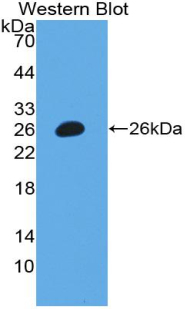Biotin-Linked Polyclonal Antibody to Carbohydrate Antigen 125 (CA125) 

MUC16; Cancer Antigen 125; Mucin 16,Cell Surface Associated; Ovarian Cancer-Related Tumor Marker CA125; Ovarian Carcinoma Antigen CA125
Overview
Properties
- Product No.LAA154Hu71
- Organism SpeciesHomo sapiens (Human) Same name, Different species.
- ApplicationsWB; IHC; ICC.If the antibody is used in flow cytometry, please check FCM antibodies.
Research use only - DownloadInstruction Manual
- CategoryTumor immunityReproductive science
- SourceAntibody labeling
- Ig Type IgG, Potency n/a
- PurificationAntigen-specific affinity chromatography followed by Protein A affinity chromatography
- LabelBiotin
- Original Antibody PAA154Hu01-Polyclonal Antibody to Carbohydrate Antigen 125 (CA125)
- Buffer Formulation0.01M PBS, pH7.4, containing 0.05% Proclin-300, 50% glycerol.
- TraitsLiquid, Concentration 500µg/mL
Sign into your account
Share a new citation as an author
Upload your experimental result
Review

Contact us
Please fill in the blank.
Specifity
The antibody is a rabbit polyclonal antibody raised against CA125. It has been selected for its ability to recognize CA125 in immunohistochemical staining and western blotting.
Usage
Western blotting: 0.5-2ug/ml
Immunocytochemistry in formalin fixed cells: 5-20ug/ml
Immunohistochemistry in formalin fixed frozen section: 5-20ug/ml
Immunohistochemistry in paraffin section: 5-20ug/ml
Enzyme-linked Immunosorbent Assay: 0.05-2ug/ml
Optimal working dilutions must be determined by end user.
Storage
Store at 4°C for frequent use. Stored at -20°C in a manual defrost freezer for two year without detectable loss of activity. Avoid repeated freeze-thaw cycles.
Stability
The thermal stability is described by the loss rate. The loss rate was determined by accelerated thermal degradation test, that is, incubate the protein at 37°C for 48h, and no obvious degradation and precipitation were observed. The loss rate is less than 5% within the expiration date under appropriate storage condition.
Giveaways
Increment services
-
 Protein A/G Purification Column
Protein A/G Purification Column
-
 Staining Solution for Cells and Tissue
Staining Solution for Cells and Tissue
-
 Positive Control for Antibody
Positive Control for Antibody
-
 Tissue/Sections Customized Service
Tissue/Sections Customized Service
-
 Phosphorylated Antibody Customized Service
Phosphorylated Antibody Customized Service
-
 Western Blot (WB) Experiment Service
Western Blot (WB) Experiment Service
-
 Immunohistochemistry (IHC) Experiment Service
Immunohistochemistry (IHC) Experiment Service
-
 Immunocytochemistry (ICC) Experiment Service
Immunocytochemistry (ICC) Experiment Service
-
 Flow Cytometry (FCM) Experiment Service
Flow Cytometry (FCM) Experiment Service
-
 Immunoprecipitation (IP) Experiment Service
Immunoprecipitation (IP) Experiment Service
-
 Immunofluorescence (IF) Experiment Service
Immunofluorescence (IF) Experiment Service
-
 Buffer
Buffer
-
 DAB Chromogen Kit
DAB Chromogen Kit
-
 SABC Kit
SABC Kit
-
 Real Time PCR Experimental Service
Real Time PCR Experimental Service
Citations
- Selective Blocking of TNF Receptor 1 Attenuates Peritoneal Dialysis Fluid Induced Inflammation of the Peritoneum in Mice.pubmed:27755542
- KPNA2 is a potential diagnostic serum biomarker for epithelial ovarian cancer and correlates with poor prognosispubmed:28651492
- Diagnostic value of HE4+ circulating tumor cells in patients with suspicious ovarian cancerPubmed:29484129
- Prognostic value of STC1 expression in ovarian cancer
- Synergistic effect of Tripterygium glycosides and cisplatin on drug-resistant human epithelial ovarian cancer via ILK/GSK3β/Slug signal pathwayPubmed:35422913






